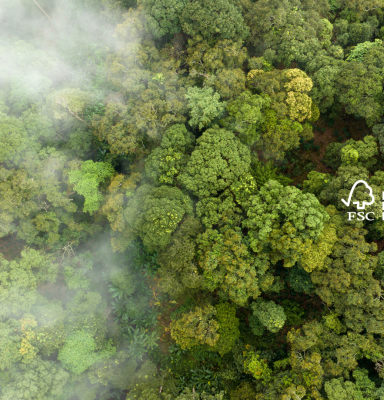
Quick overview about the EUDR
-
Why EUDR?
Deforestation is a main driver of the climate and biodiversity crises, and the EU contributes to it by consuming a significant share of products associated with deforestation. The Intergovernmental Panel on Climate Change (IPCC) has found that halting deforestation and restoring ecosystems is one of the most efficient ways to reduce CO2 levels and thus fighting climate change.
The EUDR aims to ensure that a set of key products traded and consumed in the EU and globally no longer contribute to deforestation and forest degradation.
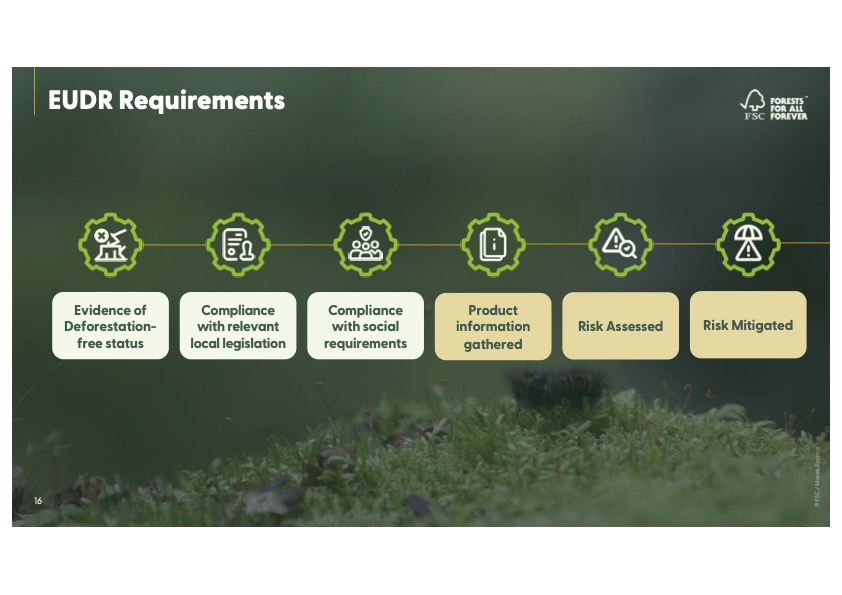
The main driver of deforestation and forest degradation is the expansion of agricultural land, which is linked to the production of commodities we import such as soy, beef, palm oil, wood, rubber, cocoa, and coffee. As a major economy and consumer of these commodities linked to deforestation and forest degradation, the EU is partly responsible for this problem — and it wants to answer the strong call of European citizens to lead the way to solve it.
The aim of the new rules is to prevent deforestation and forest degradation. This would also mean a reduction of at least 31.9 million metric tons of carbon emissions to the atmosphere every year due to EU consumption and production of the relevant commodities, which could be translated into economic savings of at least € 3.2 billion annually. (Source: European Commission)
-
Which products does EUDR apply to?
The EUDR applies to wood, rubber, palm oil, soy, beef, coffee, and cacao. Wood products, which are most connected to harvesting, have additional 'degradation-free' requirements.
Within each commodity, the regulation defines which products are included within the scope of the law, according to a list of EU customs codes. The list (found in an Annex to the regulation) also includes some derived products such as leather, chocolate, and furniture.
-
What does the EUDR mean for companies?
While the EUDR is a European legislation, its implications are global. Companies placing or exporting the affected products in or from the EU market will have to conduct due diligence to confirm that the products have not been sourced from land which was deforested or degraded after 31 December 2020.
Before putting any product on the EU market, operators must produce a due diligence statement to ensure that only deforestation-free and legal products (according to the laws of the country of origin) are allowed on the EU market.
Due Diligence Process
1. Gather product information – Operators will be required to collect information regarding quantity, geolocation, legality, and deforestation. (Article 9, EUDR)
2. Conduct risk assessment – Operators will be required to conduct a risk assessment to establish whether there is a risk that the relevant products intended to be placed on the market or exported are non-compliant. This includes consideration for the presence of Indigenous Peoples in the area the product is produced. (Article 10, EUDR).
3. Mitigate risks – If the risk assessment reveals no, or only negligible risk, then risk mitigation may not be necessary. However, if there is reasonable doubt, operators will be required to develop risk mitigation procedures and measures such as independent audits. (Article 11, EUDR)
-
How will I know whether EUDR applies to me?
If you are an FSC Certificate Holder and you would like to know whether EUDR applies to you, you can search your product code in the FSC Product Classification & Harmonized System Alignment (FSC-GUI-40-004a-01 V1-0) guidance document (available for download under "Resources" at the bottom of this webpage).
-
EUDR timelines
The EUDR entered into force on 29 June 2023, which will provide companies with an 18 months before being required to implement the rules beginning 30 December 2024. Exemptions and specific provisions will be applicable for micro and small enterprises (SMEs).
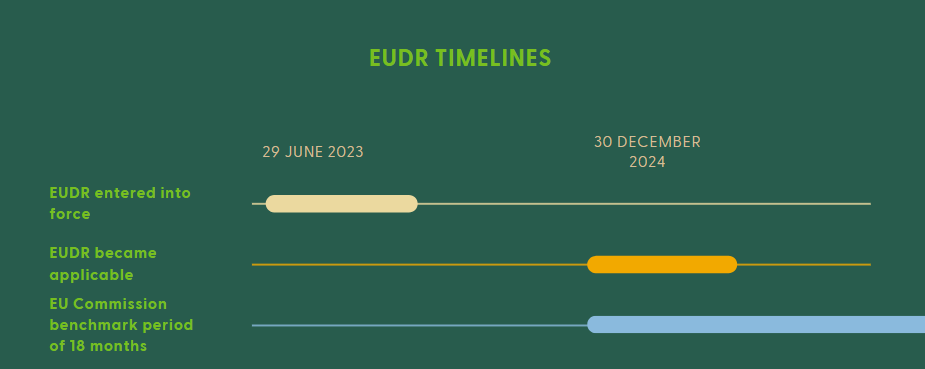
In the next 18 months, the Commission will also benchmark countries, or parts of them, and will determine their levels of deforestation risk, which could be low, standard, or high. Products from low-risk countries will be subject to a simplified due diligence procedure. Assessments from the EU Commission may be revised over time. In parallel, FSC is assessing how its standards align with the EUDR while identifying required steps to further support operators and traders to comply with it.
-
Some EUDR terms and definitions
Deforestation: the conversion of forest to agricultural use, whether human-induced or not.
Forest Degradation: structural changes to forest cover, taking the form of the conversion of:
- primary forests or naturally regenerating forests into plantation forests or into other wooded land; or
- primary forests into planted forests.
Operator: any natural or legal person who, in the course of a commercial activity, places relevant products on the market or exports them;
Trader: any person in the supply chain other than the operator who, in the course of a commercial activity, makes relevant products available on the market.
(Article 2, EUDR)
FSC Aligned for EUDR
Robust certification can help companies meet EUDR requirements. As one of the most robust sustainable forestry solutions, FSC is strongly aligned with the EUDR legality and sustainability requirements and can help companies assess and minimize the risk that relevant forest-based products come from a land which was deforested or degraded.
Streamline your compliance journey with FSC Aligned for EUDR
FSC is taking the guesswork and complexity out of EUDR requirements, helping certificate holders become compliant on time. By 30 December 2024, your business must be EUDR-compliant if you’re selling within or exporting from the EU. Being EUDR-compliant means showing your forest-based products are legal, not sourced from deforested land, and do not contribute to degradation. It’s a complex task that we can help you with.
FSC certifications already meet EUDR legal & social needs and, in many instances, go beyond the law’s requirements. This puts certificate holders in the best starting position for their EUDR compliance journey.
Essentially, FSC Aligned for EUDR comprises:
|
FSC Aligned Certification for EUDR |
FSC Aligned Reporting for EUDR |
|
Supported by FSC Risk Hub |
Powered by FSC Trace |
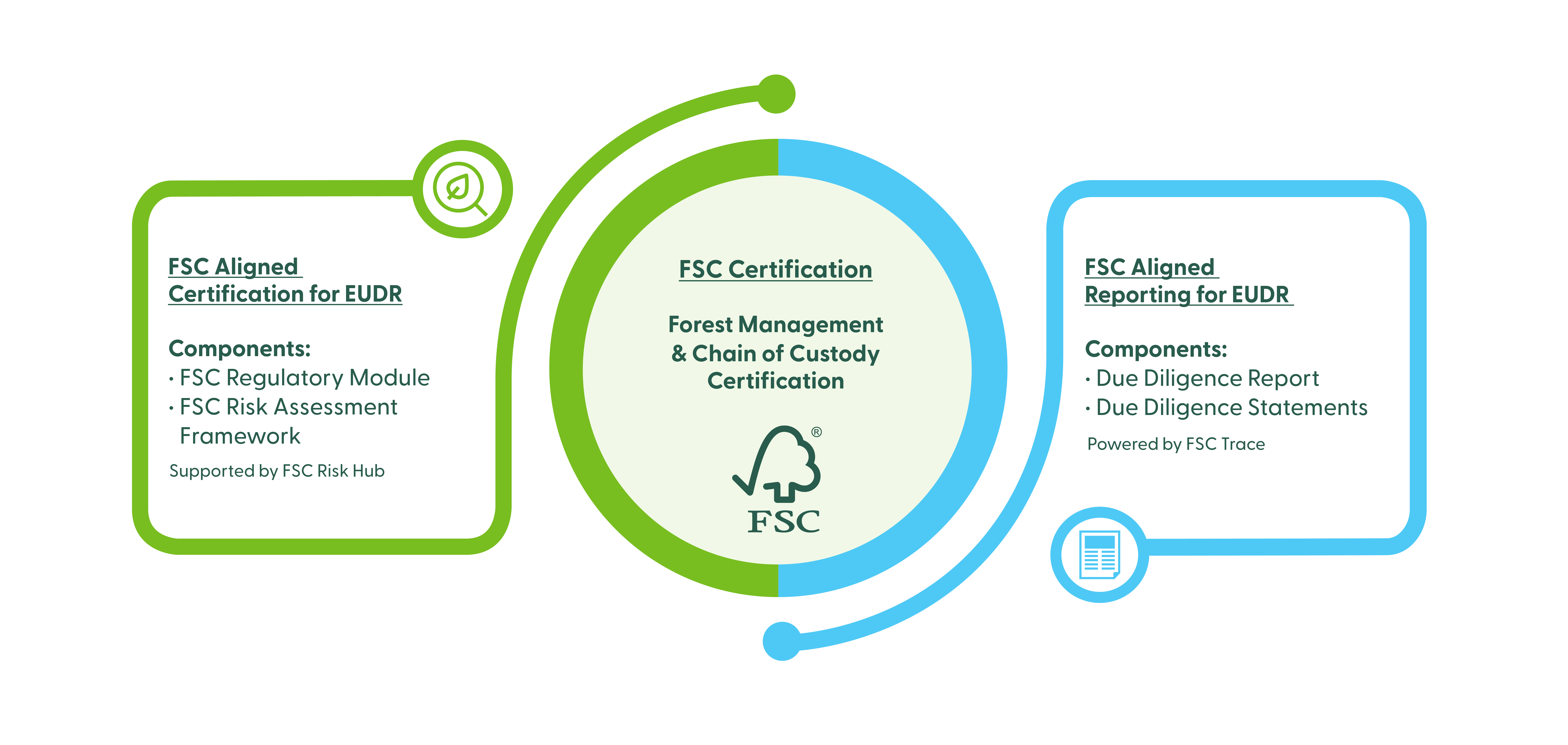
[It is important to note that, while schemes can help meet due diligence requirements, being certified does not automatically exempt companies from their EUDR duties. All relevant actors must play their part in the fight against deforestation.
Watch the videos below for a quick introduction to FSC Aligned for EUDR.
Benefits of FSC Aligned for EUDR
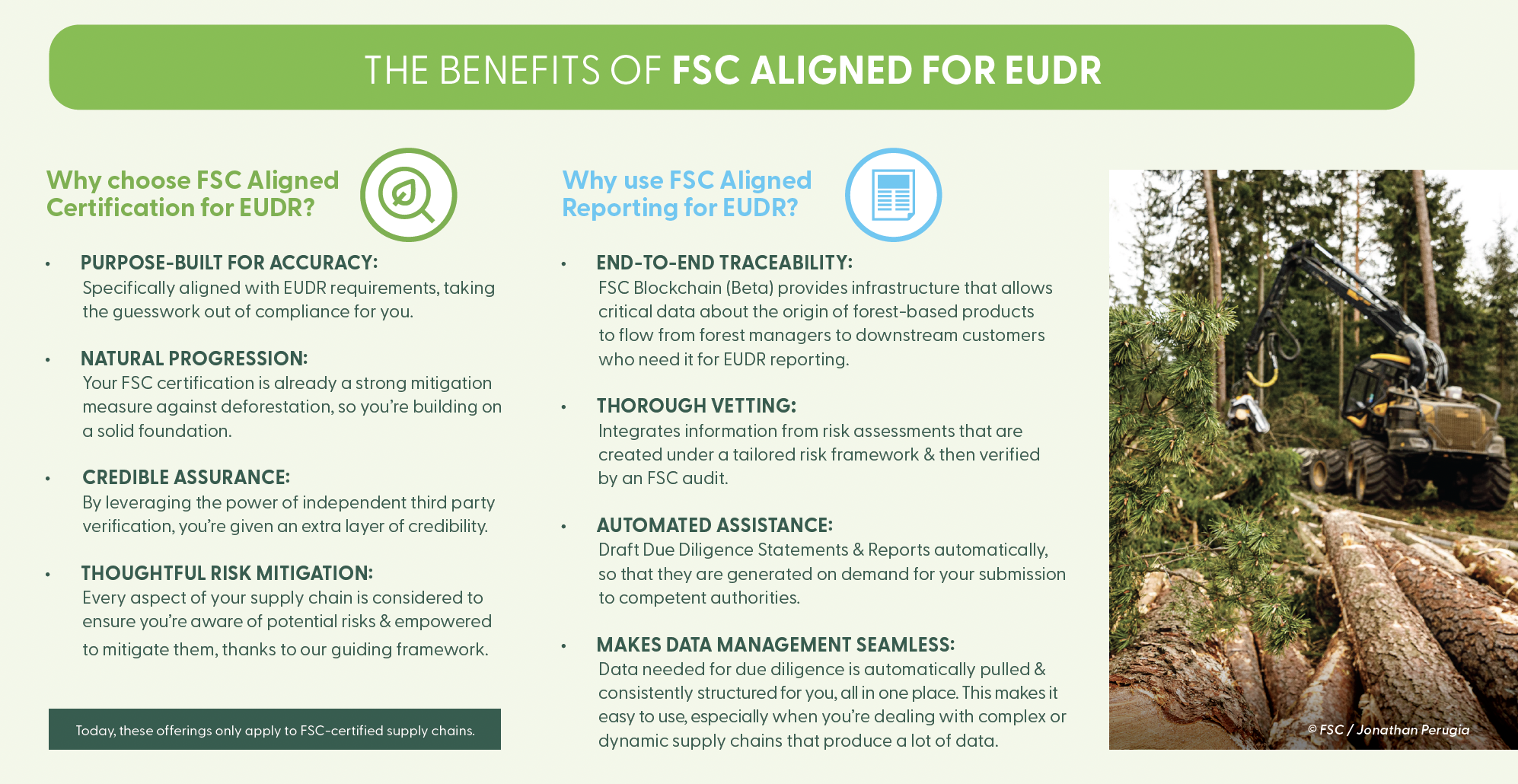
FSC Aligned Certification for EUDR

The two components of FSC Aligned Certification for EUDR, i.e. the FSC Regulatory Module and FSC Risk Assessment Framework, along with system-wide updates, serve to strengthen FSC’s commitment to sustainable forestry.
Benefits of FSC Aligned Certification for EUDR
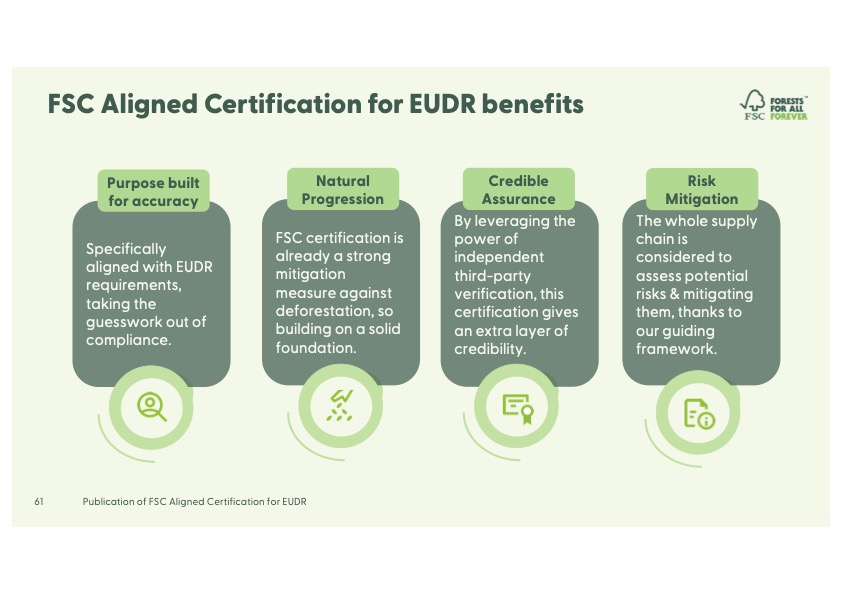
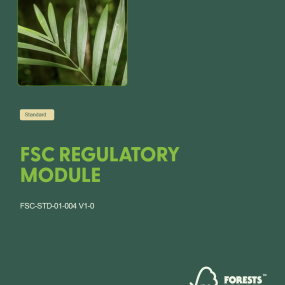
FSC Regulatory Module
This new voluntary add-on module builds on FSC’s rigorous responsible forestry practices with specific EUDR regulatory expectations around risk, due diligence, & transparency in supply chains.
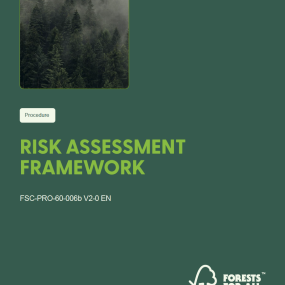
FSC Risk Assessment Framework
This framework provides a comprehensive tool for companies to assess and mitigate risks of sourcing forest materials.
FSC Aligned Reporting for EUDR

FSC Aligned Reporting for EUDR powered by FSC Trace is the solution specifically developed to meet EUDR obligations concerning data gathering and reporting.
FSC Trace (formerly known as FSC Blockchain), which will be launched in Aug/Sep 2024, is a secure data-sharing technology dedicated platform for FSC certificate holders that will facilitate traceability requirements.
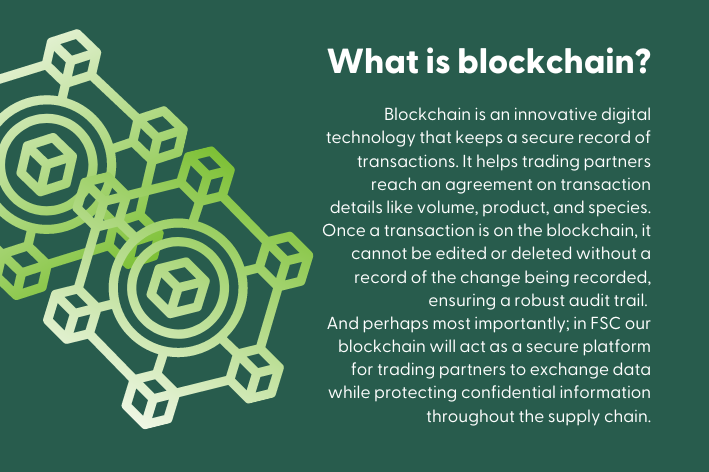
Built on blockchain technology, the platform enables participants to confidentially, flexibly, and efficiently access and exchange relevant data throughout the supply chain, to assist with verification, due diligence and demonstrate conformity with evolving regulations, including the EUDR.
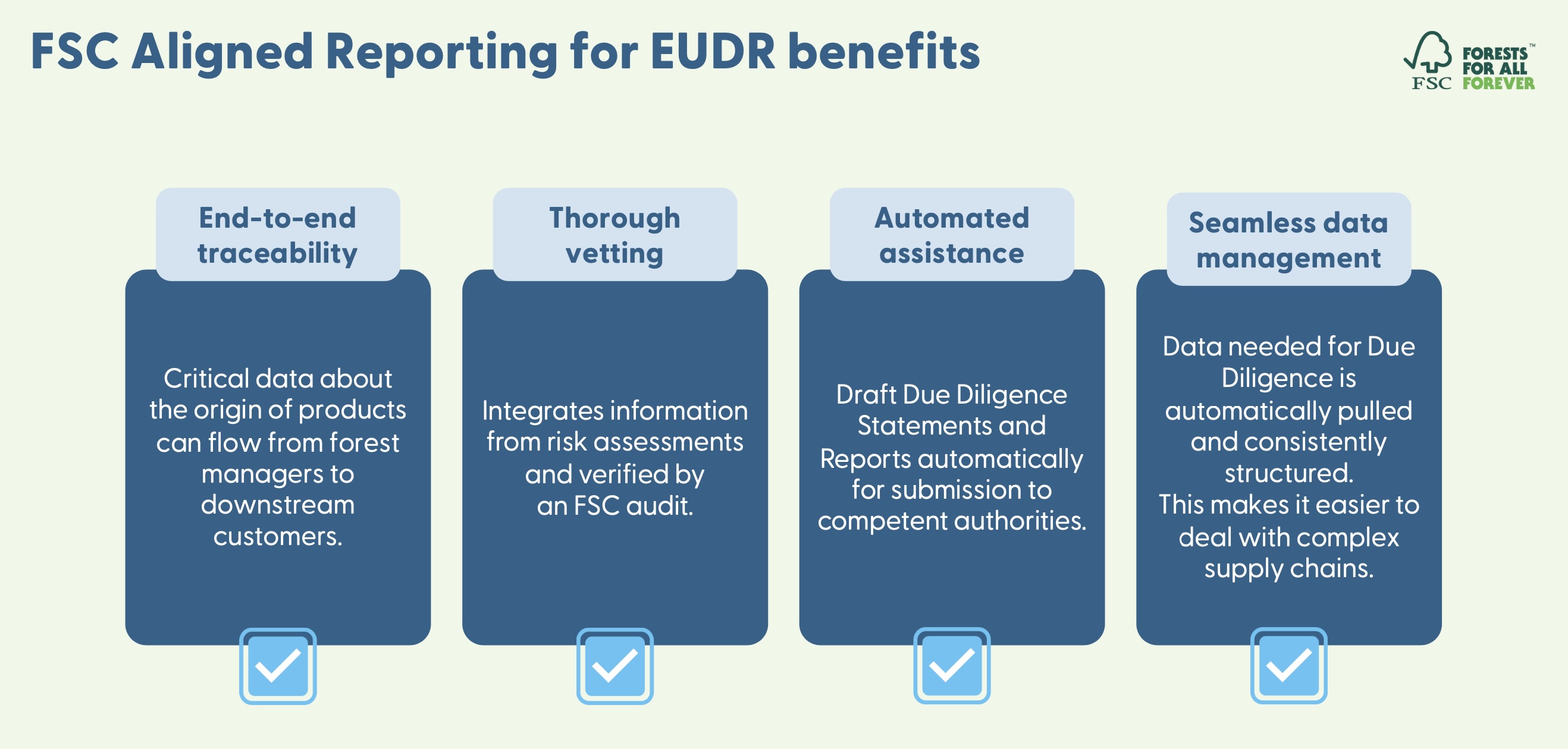
Learn about how blockchain helps improve FSC’s supply chain here.
Learn more about FSC Trace below.
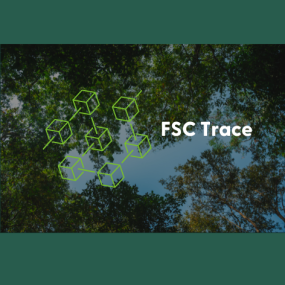
FSC Trace
FSC Trace is a pivotal platform in fulfilling FSC's commitment to assisting licence holders in due diligence and complying with evolving regulations globally.
System-wide changes through Advice Notes
To further tighten the FSC system to deliver deforestation-free products, FSC fast-tracked the implementation of changes from the intention of FSC’s Policy to Address Conversion. These changes are introduced to the existing system in the form of Advice Notes - which will ultimately ensure products are deforestation and degradation free in alignment with the EUDR and do not enter the system and become FSC-certified.
Additional Advice Notes for chain of custody and controlled wood users are included to support the implementation of the FSC Regulatory Module and align with global best practices.
The following Advice Notes have been published and are immediately effective for users of the FSC Regulatory Module:
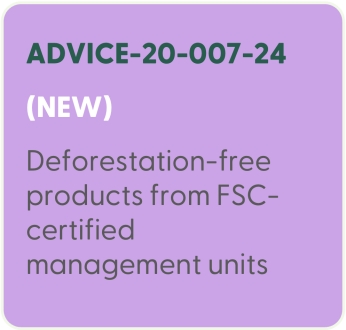
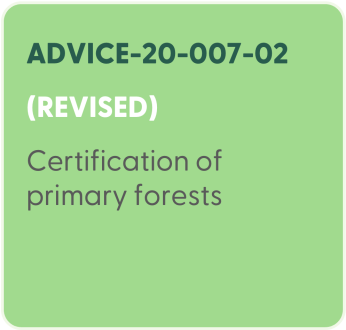
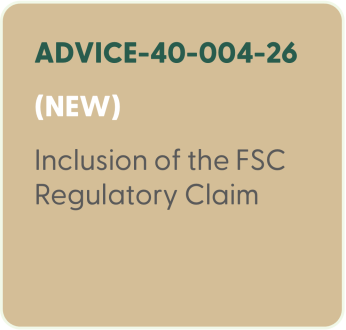
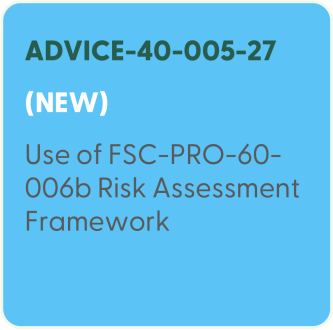
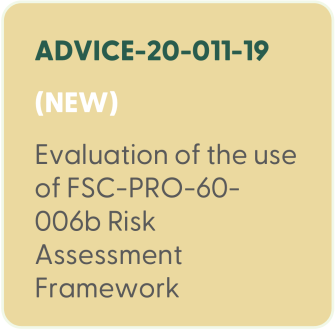
Key Effective and Implementation Dates
FSC Aligned Certification for EUDR was launced on 1 July 2024.
Start using FSC Regulatory Module and FSC Risk Assessment Framework.
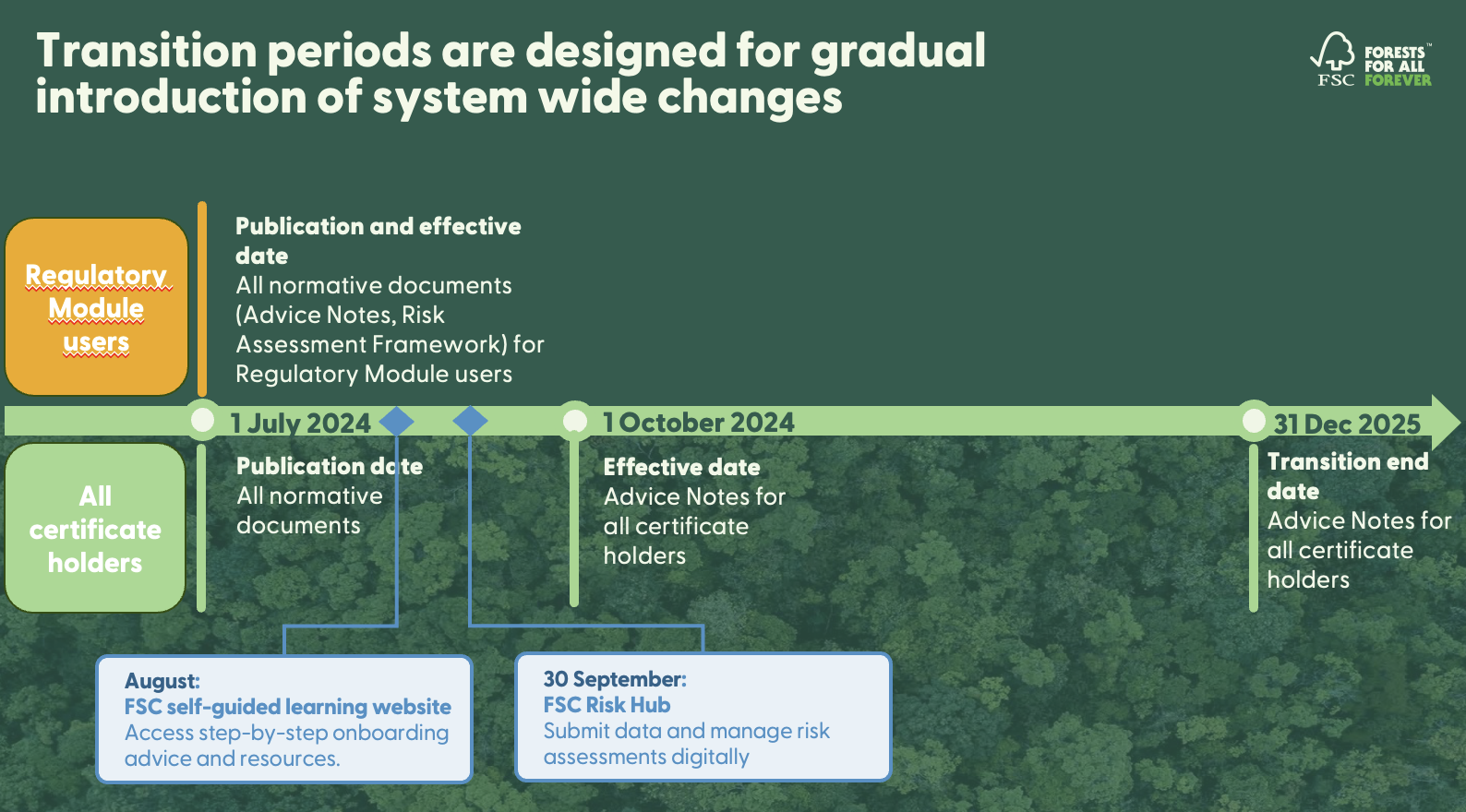
6 steps companies can take to prepare for EUDR
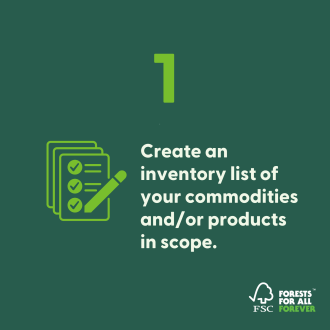
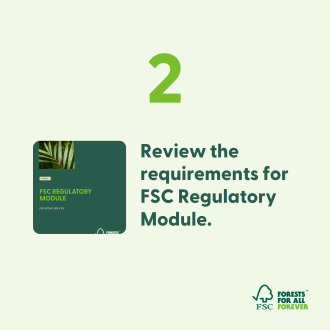

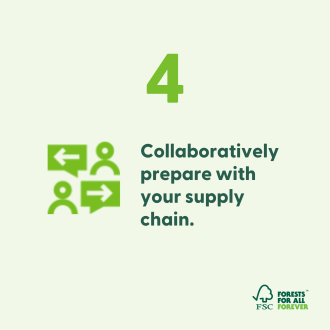
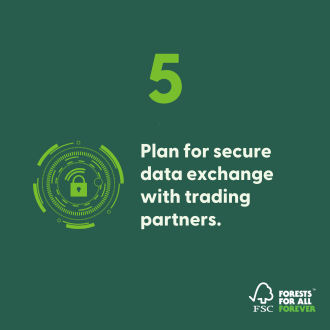
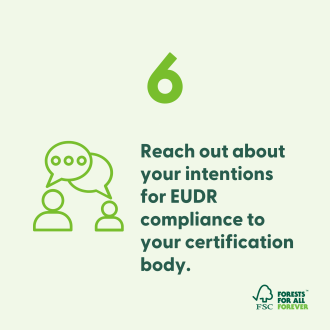
Resources
For a complete list of documents, videos, podcasts and infographics explaining FSC Aligned for EUDR, please visit FSC EUDR Resource Centre. (click on the button at the bottom of this page).
Contact FSC EUDR task force
Send your questions and queries to our dedicated mailbox: EUDR@fsc.org.
